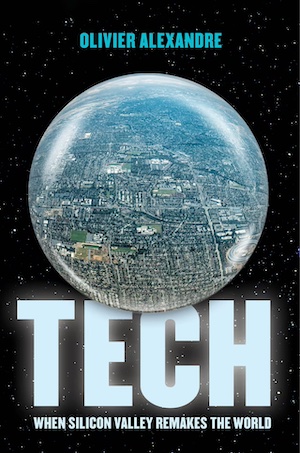Olivier Alexandre Tech: When Silicon Valley Remakes the World University of California Press 344 pages, 6 x 9 inches, ISBN 9780520413740 link to the book
In a Nutshell
I’m French. And I’m a sociologist. This book is about Silicon Valley. It’s the one I wanted to read when I started my field work in Northern California in 2015. It didn’t exist back then. Plenty of great books and papers have been written on Silicon Valley, in history, geography, law, business, communication, and so forth. Tech journalists have been busy, too. But there was no real systematic sociology of Silicon Valley as a whole. So even if I was a foreigner and a complete outsider, I said to myself: let’s have a try! At that time, I knew nothing about tech, its industry, history, or products. I know no techie either, their lives, habits, career paths, and mentality. Ten years later, I think the book presents a detailed, fair, and complete portrait of the industry, its organization, economy, culture, and beliefs.
The observation at the beginning of this work was this: we are surrounded by tech, Silicon Valley products, stories, ideologies, company valuations, superstar entrepreneurs, some of them even working in or for the Trump 2 administration. It’s part of our life and our world. But Silicon Valley is a world by itself. My point is to say: to really understand it, we had to go beyond the common stereotypes and mainstream narratives about tech. Because if we stay focused on big names, big companies, or the latest trendy piece of tech, we will miss the most important thing, which is me thatin tech the star is not this entrepreneur or that company. The star is the system. Whatever the key compound is: data, people, infrastructure, capital, and so forth. The system is everything.
So the book is an attempt to get a holistic view of Silicon Valley as a system. Including its impact. Not only the impact that tech people mention all the time. But also the social outcome and dead end of this system, meaning the way tech is designing the society we live in, without considering some social issues and creating new ones. Because indeed, this industry produces private solutions, but many in the world perceive it today as a public problem.
The wide angle
My previous research was about the French movie industry. In 2014, Netflix was just arriving in France, opening up an office in Paris. I got funding for studying this company located in Los Gatos, CA, which seemed to be having a very different mentality, way to produce and distribute content, than the LA studios. A lot of professionals were worrying about this new player coming after the French and European markets. I’ve been invited as a visiting scholar at Stanford University, mostly thanks to Professor Fred Turner (I owe him a lot!), who wrote a wonderful book about how and why Silicon Valley and North Cal counterculture have intersected since the 1960s.
At that point, I thought I had done the toughest part of this endeavor, i.e., get to the Valley. I was all wrong. With my work on Netflix, I’ve found out pretty quickly the meaning of what I call the tech transparency paradox. In tech, everything seems open and actionable: code, companies, people. Which it’s true… but if and only if you have something to bet, to sell, or to buy. It could be your coding skills, your network, your money, your intel about a special market or country, or even your entertainment and leisure activities (from climbing to clubbing). But I had nothing to sell or to buy. So Netflix doors stayed closed to me.
I had to take another path. My own path, which was, I realized it later, the path of many in tech. In Silicon Valley, most people come from a different state in the US, and half of them are born in a country other than the US. Mainly from India, China, or Europe. They came pretty young, are mostly male, and are college boys. They are away from their friends, families, cultures, churches, institutions, news, and politics of their country. So basically, they have nothing else to do than go to work. And coming from sometimes quite a social constraint milieu, they fall in love with this pretty tolerant, tech enthusiast, and risk-taking environment, which is Silicon Valley. At least, it’s the way they described it.
And they put everything in it. But working in Silicon Valley is not just a way to get paid or get successful. Quite the opposite, actually. Because most of the time, people fail, products crash, ideas are thrown into the trash, and are just copied. If techies are ok with that, it’s because working in tech means to them learning something new. Of course, people in tech chase success. But this success doesn't necessarily mean making a fortune. It means learning something and making things work: their code, product, company, and for some of them also their body, society, and the government. Sometimes with as determination as naivety. For doing that, they think they have to measure everything, based on information, continuously improving the system, whatever the system is, and even if the system is not really a system. Because the body, or a society, is quite different from a computer system.
A close-up
I guess there are different ways to read this book.
I designed it to make people see Silicon Valley in 3D. Like the cover does: it shows Silicon Valley in a bubble, and this bubble is also a world, seen from space. You can see here the different layers of perspectives present in the book. More precisely, the book shows tech in 3 dimensions: first, its space, because Silicon Valley is a place; second, through time, because Silicon Valley has a history, and pretend to build up the future; third, through tech itself, because code, programmation interfaces, API, models, and so forth, composed the work and cognitive environment of techies. They are like Neo in the Matrix. A matrix invisible to non-technical people.
Going through the book, the reader can also pick one chapter, like the one on programmers, if he wonders about this weird but important professional tribe. Or the one about Burning Man, for getting a better idea of how and why people in a very rational world renew their own enchantment.
And if you’re tired of my sociological analysis, you can just skip them and get to the quotes of the interviewees. The book relies on more than 150 interviewees and displays a large collection of original quotes.
Finally, you can compare the tone of the introduction and of the conclusion. Like I said, I started my field work in 2015. It was the year before the first election of Donald Trump in the Presidential election. Very few supported Trump in tech at that time. I finished the book in 2025. Right before his second election. A lot of tech leaders have supported him since then. I guess it’s a sufficient timeline to both avoid stereotypes and get a clearer picture about the evolution of tech, as an industry and a world which has become so important in our economy, politics, and life.
Lastly
Thanks to the book, I hope that general readers will get a better understanding of the tech industry, without demonizing or idolizing it.
That also means that people in tech get a better understanding of their own world, history, and the limitations of their tendency to see everything as a system.
Maybe at some point, my two kids, when they are an age to choose a job or just use Silicon Valley products, will read the book to know and understand where they come from.
And if I got a Delorean and was able to get it back ten years ago, I would gladly give this book to the 2015 me, saving myself ten years of hard work on tech!
.jpg)




